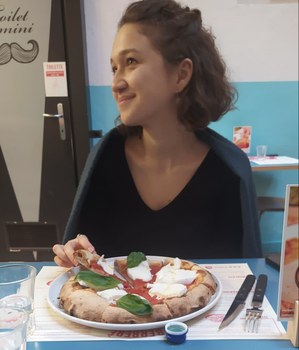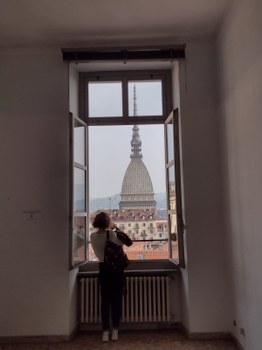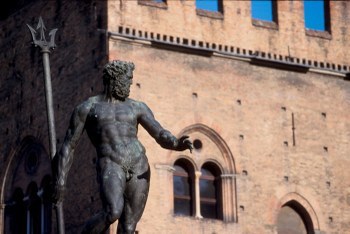Maria is a Student Ambassador from Moscow, Russia, and studies at the MA in Innovation and Organization of Culture and the Arts (GIOCA) in Bologna
Published on 25 August 2022 | Europe

My name is Maria and I come from Moscow, Russia. I obtained my bachelor’s degree in Sociology from the NRU Higher School of Economics in Moscow, and now I am a second-year student at the master’s degree programme in “Innovation and Organization of Culture and the Arts” – GIOCA – here at Unibo. I am also part of the core organisational team of De Structura – a project that focuses on the issues of youth employability in the cultural sector.
At the beginning there was an exchange programme...
My story with Unibo started with an exchange programme. I came here for six months as an exchange student during the third year of my bachelor’s degree. This exchange represented an opportunity to explore different ways of living, go outside of my comfort zone and dive deeper into my interests outside my field of studies.
The city and the university immediately struck me for their atmosphere, their student life and the wide range of opportunities that the university provided. They struck me so much that I decided to extend my exchange period for another six months and that’s when, almost by accident, I stumbled upon the GIOCA degree programme. At that time, I was thinking about shifting my career towards the cultural sector and I understood that GIOCA was the perfect degree for the career path I had in mind.
So, during the last year of my BA in Moscow I focused more on studying cultural-related subjects and getting work experience in this sector. Moreover, I wrote my dissertation about contemporary art, did an internship in a cultural organisation and worked on an art-related start up. I also studied for the GRE test to apply for a scholarship and tried to improve my Italian. By the end of the year, I was sure I wanted to continue my career path in the cultural sector.

GIOCA, a great mix of practice and theory
GIOCA is a degree programme focusing on management in the arts and culture sector. What I particularly like is its diversity, both in terms of students’ backgrounds and courses offered. We have a variety of courses covering different aspects of working in the cultural sector – from art theory to budget planning. Another great feature of this degree programme is its hands-on approach to better understand how this sector actually works. During our studies, we meet several professionals, analyse real organisations, design our own projects and communicate with active cultural organisations. We also have the possibility to travel with our professors to different cities and explore different cultural organisations and exhibitions. In my case, I got the opportunity to visit Turin and the Biennale Architettura in Venice. Moreover, another point in favour of the GIOCA degree programme is that our professors actively work in the field of arts and culture. This means that they can share their know-how and give practical advice related to our individual career paths and future projects.
My degree programme is taught in English and my group of friends here in Bologna is very international, so I speak English most of the time. However, I feel rather comfortable talking with my friends, reading books or watching movies in Italian which I improved thanks to the courses offered by the university. The process of learning Italian is fun by itself, especially when you have Italian friends who will explain to you what you cannot really learn from books.
Planning ahead is essential if you want to get a scholarship
I am receiving the Unibo Action 2 study grant which is given to international students on the basis of GRE test results. This grant allows me to feel financially secure and focus better on my studies and career development. The test is not an easy one and I prepared thoroughly for it. My best advice is to start thinking about scholarship opportunities in advance, especially if you want to apply to several universities. Taking a gap year might also be a good choice as you give yourself some time to prepare for enrolment and scholarship exams.
Unibo services make living in Bologna even more easy. Libraries and study rooms are almost my second home, the atmosphere there is great and helps you being productive and get things done. Unibo digital services, such as Studenti Online and Virtuale, are very useful: there you can find all the information about your study plan, calls, internship opportunities and much more.

Bologna, a tribute to slow-life
I first arrived in Bologna in 2018, so I lived in the city both before and after the pandemic. Bologna felt completely different from my life in Moscow. There, it is not uncommon to spend an hour in public transport to go from your home to the university and another hour to go back. Furthermore, you are almost always in a rush. However, you can be certain to find whatever you need at almost any time of day or night. On the contrary, Bologna seemed a very slow-paced city at first with long lunch breaks, earlier closing times and restaurants working only in particular hours. It definitely took me some time to get used to it, but in the end I started appreciating the slower rhythm of this country. I started seeing it not as an inconvenient, but as a way of giving you space to enjoy your daily life away from your work or study responsibilities.
Adapting to a new city was difficult in the beginning, but fortunately there were a lot of opportunities that made it easier. I found an accommodation through a person I know who graduated from the same MA as mine. Now I live with two other girls, both Unibo students, who are like sisters to me. Moreover, I got in touch with other people from my home university who came to Bologna and got useful advice from the international desk about administrative procedures. There are many international students here in Bologna and you never feel an outsider, you can always find other students going through similar experiences and you can exchange useful advice with each other.
The city and the university overflow with activities
Bologna offers a lot of opportunities to spend your free time, you can do almost anything here: you can have productive study time, visit many museums, hike in the hills, do sports in parks or live a bright nightlife. It’s my third year living here, and I still have a lot of places to visit on my list. I live in the historic centre close to the faculty where I usually attend my classes and I can reach almost any destination on foot. A great feature of Bologna is its porticos, I hardly remember having to use an umbrella or suffering under the sun in summer!
I try to take part in the activities that Unibo and my degree programme organise. For example, during my exchange year, just out of curiosity I attended the Start Up day and there I found an interesting start up related to contemporary art that I eventually joined. This led me to later develop a branch of it in Moscow. Events such as the Start Up day, open lectures and meetings with alumni are great opportunities to be inspired and get new opportunities to express yourself and show your skills.
Unibo as s place of growth
Studying at Unibo has been one of my best experiences so far and I would definitely recommend it to other fellow students. The University of Bologna provides a lot of opportunities to learn and creates a great environment to express yourself and your talents. In the end, studying at the university is much more than just attending classes: you understand who you are, what you enjoy and are good at. At the University of Bologna, I personally found a stimulating environment. Bologna is the perfect city to spend your university years in – it’s lively, very diverse and international, yet relaxed and comfortable.